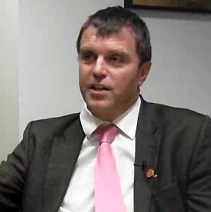Nigel Topping is CEO of the We Mean Business Coalition and executive director of CDP, which works with companies to measure and disclose their environmental and climate impact and put that knowledge at the heart of decision making. He spoke at the World Bank Group about the power of transparency and carbon pricing.
"It seems to be obvious given the scale of business in the world that we will not address climate change without business changing its behavior so that business delivers solutions. Business is great at innovating, and markets are great at allocating resources efficiently so we find the best ways to solve problems, they just need the right signals.
All markets have rules, they have constraints. We don't allow complete freedom of labor around the world because people are protective of their markets. We don't allow little children to go down mines anymore because we've decided as a society that we don't want that. We've banned all sorts of pollutants because we don't want to expose ourselves to them.
We just have to change the rules so that the negative effects of business, the externalities like climate change, cost money to the businesses that cause them so that they are incentivized to innovate away from them, or investors are incentivized to stop investing in those companies that have a declining business model and start investing in the innovative businesses that are finding the solutions.
So, it's not capitalism per se, it's the current model of capitalism, which we are evolving and which we need to evolve and we need to evolve fast.
We just have to change the rules so that the negative effects of business, the externalities like climate change, cost money to the businesses that cause them so that they are incentivized to innovate away from them, or investors are incentivized to stop investing in those companies that have a declining business model and start investing in the innovative businesses that are finding the solutions.
So, it's not capitalism per se, it's the current model of capitalism, which we are evolving and which we need to evolve and we need to evolve fast.
Is internal carbon pricing enough? No. We are seeing more and more companies using it. In research we just published, 150 large companies are already disclosing that they use a price on carbon. We think a lot more do. The important thing is that they're using it because they're assuming that it’s going to come.
Businesses are rational. They understand the science. They know that climate change is real. They know that the consequences are getting worse. They know that governments will have to act. We already have a price on carbon in many jurisdictions, and we will get it in more jurisdictions, and it will go up.
So, intelligent, well-run businesses are making estimates of what the likely future price on carbon will be. It’s not enough for them to make those estimates. Governments have to follow up. As they are, with China announcing it is going to have a nationwide price on carbon by 2016.
The fact that business is using a price on carbon is because they are expecting regulators to regulate. That expectation will have to be met by regulators in order for us to peak early enough to prevent runaway climate change.
Transparency is absolutely key at the level of the individual business, but what's really exciting that we're starting to see now is transparency at the level of investors' whole portfolios. With leading investors like AP4, ERAFP, Amundi committing to publish their portfolio carbon footprints, so you take that total transparency of their portfolio, you factor in a carbon price, real or assumed in the future, then you get the kind of new, intelligent decarbonization investment strategies that are really radically taking carbon out of portfolios.
That's sending a signal back to managers to say, hey, if we don't take carbon out of our business, the cost of capital is going to go up. So we're starting to get this positive reinforcement. So transparency plus a price on carbon will be what leads to radically accelerated decarbonization."


Join the Conversation